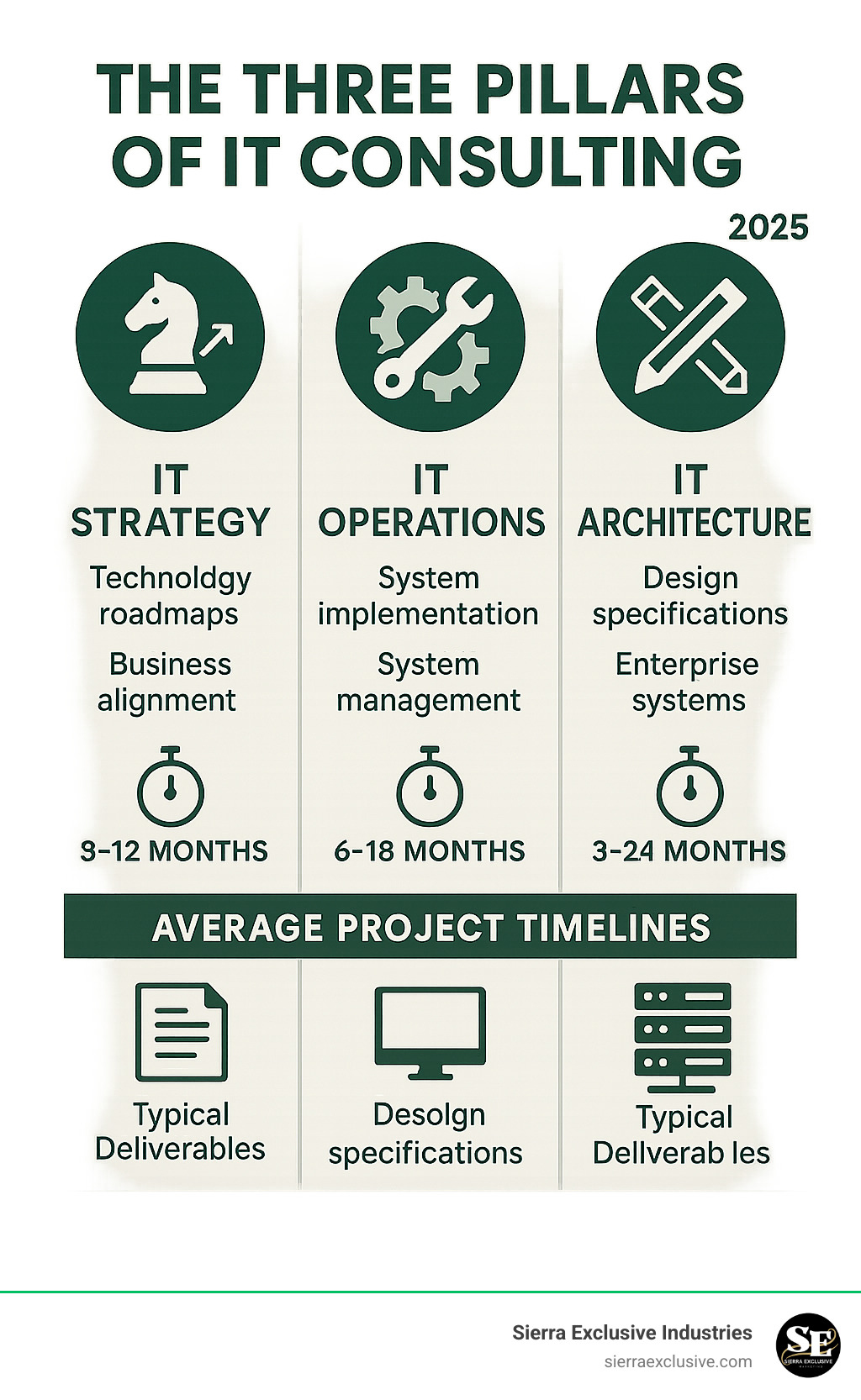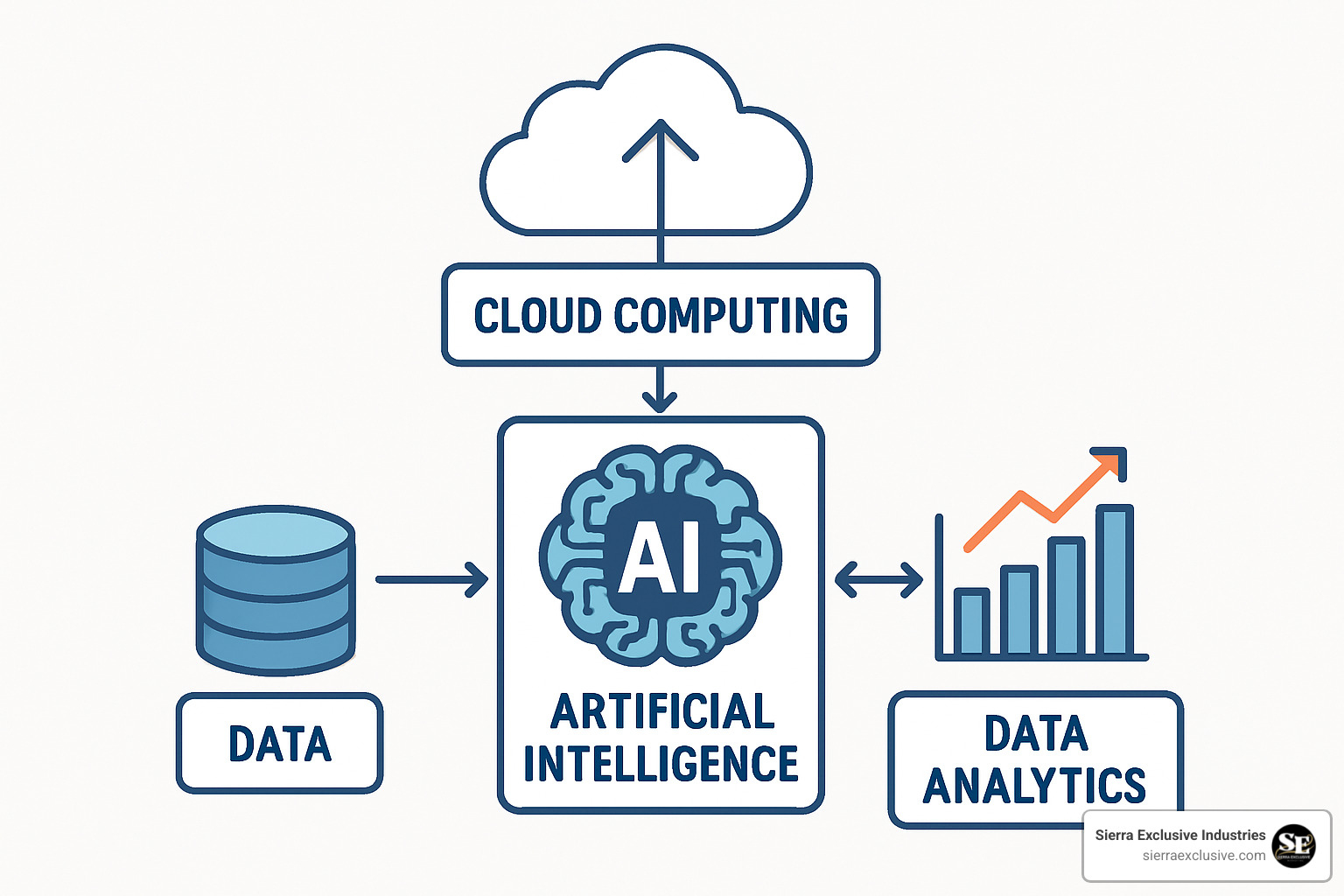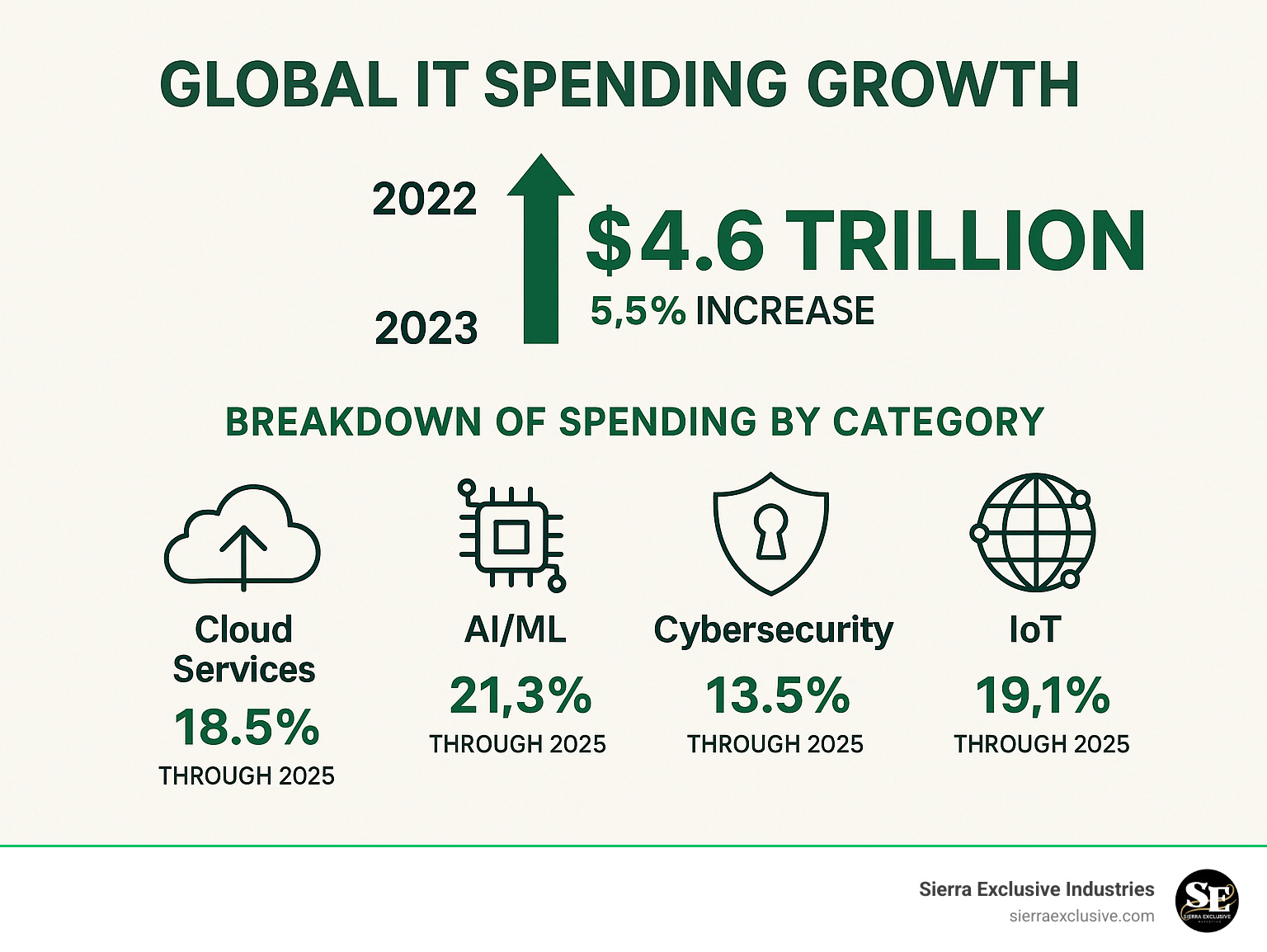Why Consulting Tech Companies Are Essential for Modern Business Growth
Consulting tech companies have become the backbone of digital change, helping businesses steer everything from cloud migration to AI implementation. With worldwide IT spending projected to reach $4.6 trillion in 2023 (see the latest figures from Statista), these firms are no longer just “nice to have”—they’re essential partners for survival in today’s tech-driven economy.
Across the industry, market leaders collectively generate well over $200 billion in annual revenue and employ hundreds of thousands of specialists on every continent. While individual players vary in size and focus, the top tier generally delivers three critical offerings:
- IT Strategy – mapping technology investments to measurable business outcomes.
- IT Operations – implementing and managing systems over multi-year engagements.
- IT Architecture – designing technical blueprints that keep complex environments working in harmony.
Unlike traditional management consulting that often stops at high-level PowerPoint strategies, tech partners roll up their sleeves and stay for the build-out and maintenance phases. That hands-on approach is one reason IT consultants now average about $87,000 per year, with seasoned experts surpassing six figures.
As Seth Gillen, I’ve spent more than a decade scaling companies by teaming up with multiple consulting tech companies that actually deliver results—not just slick presentations. The lessons learned inform everything we do at Sierra Exclusive Industries when we help clients turn technology investments into real revenue growth.

Consulting tech companies terminology:
- business consulting services companies
- business management consultant companies
- business change consulting agency
What Consulting Tech Companies Offer and How They Differ From Management Consulting
Consulting tech companies specialize in technology-focused management consulting, but here’s where it gets interesting – they don’t just tell you what to do, they actually stick around to make it happen. Think of traditional management consulting as getting a detailed recipe, while IT consulting is like having a chef come to your kitchen and cook the meal with you.
The difference is pretty straightforward once you see it in action. When a regular management consultant walks into your office, they might spend three months analyzing your processes and hand you a beautiful PowerPoint presentation titled “Digital Change Strategy.” An IT consultant? They’ll spend the next three years actually building, implementing, and maintaining the systems that make that strategy work.
Core services from these firms cover the whole technology spectrum – cybersecurity that actually protects your data, digital enablement that streamlines your operations, AI integration that automates repetitive tasks, and IoT implementation that connects your physical and digital worlds. It’s hands-on work that requires both business smarts and serious technical expertise.
This is exactly why our Business Change Consulting Agency approach focuses on implementation, not just pretty strategies. Real business change happens when you have partners who understand both the “what” and the “how.”
IT Consulting Service Areas
IT Strategy is where everything starts – creating technology roadmaps that actually align with your business goals instead of just following the latest tech trends. Strategy consultants dig deep into your current systems, identify the gaps that are costing you money, and develop realistic multi-year plans for technology adoption.
The best part? They work directly with your leadership team to ensure every technology investment drives measurable business outcomes. No more buying expensive software that sits unused because nobody thought about how it fits into your daily operations.
IT Operations handles the real-world implementation and ongoing service management. This is where the rubber meets the road – deploying new software platforms, managing system maintenance, troubleshooting problems at 2 AM, and making sure everything actually works together.
Operations consultants often become embedded partners in your business, working on long-term contracts because they understand that technology isn’t a “set it and forget it” proposition. Your systems need constant care and feeding to perform at their best.
IT Architecture involves designing the technical specifications and establishing technology standards that guide how all your enterprise systems talk to each other. Architecture consultants create the blueprints that prevent the nightmare scenario where your accounting software can’t communicate with your customer management system.
This is particularly crucial during digital change, where legacy systems need to work alongside modern cloud-based solutions. Our Website Design and SEO Services demonstrate this perfectly – effective digital presence requires understanding both technical requirements and business objectives.
The Role in Your Business Change
The most effective consulting tech companies serve as innovation catalysts, helping you build what we call a “digital core” – the foundational technology infrastructure that lets you adapt quickly when markets shift or new opportunities emerge.
Cost reduction often happens immediately (who doesn’t love saving money?), but the real value comes from positioning your company to capitalize on emerging technologies. Whether that’s implementing AI-powered analytics to predict customer behavior or developing IoT sensor networks to optimize your supply chain, the right technology partner transforms how you operate and compete.
This change mindset aligns perfectly with our Top Business Consulting Services Companies philosophy – technology should enable business growth and create competitive advantages, not just solve technical problems. When done right, your digital core becomes the foundation for operational optimization while opening up entirely new market opportunities.
A Guide to the Leading Consulting Tech Companies

When evaluating consulting tech companies, the market tends to break down into three broad categories—each suited to different budgets, risk profiles and project scopes:
- Global Powerhouses – multinational firms that can mobilize hundreds of consultants overnight and manage multi-year programs spanning dozens of countries. Their annual revenues often exceed $50 billion, and they’re the go-to choice for Fortune-level organizations seeking complete system overhauls.
- Strategy-First Consultancies – originally known for classic management consulting, these firms have spent recent years building robust technology arms to pair high-level planning with hands-on implementation. They excel when business model redesign and technology adoption must go hand in hand.
- IT Services & Outsourcing Specialists – companies renowned for large-scale development centers and global delivery models. They focus on cost-effective build-outs, managed services and ongoing operational support, making them ideal when you need day-to-day execution more than board-room strategy.
Before selecting any partner, run through this checklist:
- Technical depth in your industry
- Proven success on similar projects
- Cultural compatibility with your teams
- Ability to scale resources quickly
- Comprehensive post-launch support
- Presence in your key geographic markets
How to Use This Information
If you’re planning a cloud migration across 40 offices worldwide, you’ll likely lean toward a global powerhouse. Launching a new digital business model? A strategy-first firm can help shape the vision and then build it. Looking to outsource day-to-day IT operations so your staff can focus on core innovation? An IT services specialist will be the most cost-effective option.
Understanding which lane best fits your needs will save months of vendor selection headaches and prevent scope-creep disasters. At Sierra Exclusive Industries, we often blend approaches: partnering with a strategy-led firm for high-level direction while bringing in a services specialist for implementation—always ensuring every technology choice ties back to measurable business outcomes.
Trends and Specializations Shaping the Future of Tech Consulting

The consulting tech companies landscape is experiencing a dramatic shift as global IT spending surged 5.5% to reach $4.6 trillion in 2023. This isn’t just about bigger budgets – it’s about fundamental changes in how businesses operate and compete.
The pandemic accelerated digital change in ways no one predicted. Companies that had been dragging their feet on cloud migration suddenly found themselves racing to enable remote work. What used to take three years of careful planning now happens in three months out of necessity.
This urgency has created a perfect storm of opportunity for consulting tech companies that can handle rapid, large-scale changes. The firms that thrive understand that speed and reliability matter more than ever – there’s no time for lengthy pilot programs when your entire workforce needs to collaborate from home.
Our AI-Powered Marketing: Opening the Next Era of Intelligent Advertising approach reflects this new reality. Businesses need partners who can implement technology solutions that deliver immediate results while building long-term competitive advantages.
Core Specializations for Modern Businesses
Cloud Computing has evolved far beyond “let’s move our servers to Amazon.” Modern cloud strategies involve complex decisions about public, private, and hybrid cloud architectures that must align with specific business needs. Migration strategies now consider data sovereignty requirements, compliance frameworks, and seamless integration with existing systems.
The best consulting tech companies don’t just move your data – they completely redesign your technology architecture for cloud-native operations. This means building systems that can scale instantly, integrate with any new tool, and provide the flexibility to adapt as business needs change.
Artificial Intelligence and Machine Learning implementation requires understanding both the technology and business context. It’s not enough to know how to build AI models – you need to know which business problems they should solve. Our AI Marketing Services demonstrate how AI transforms customer engagement when properly implemented.
Predictive analytics and automation are no longer future possibilities – they’re current necessities for competitive advantage. Companies using AI to optimize their operations are pulling ahead of competitors who are still making decisions based on gut instinct and spreadsheets.
Cybersecurity has transformed from an IT concern into a core business function. Modern cybersecurity strategies involve risk management, compliance frameworks, and threat detection systems that integrate seamlessly with business operations. The most effective consulting tech companies embed security considerations into every technology decision rather than treating it as an afterthought.
Internet of Things (IoT) implementation involves creating sensor networks and smart device ecosystems that generate actionable business intelligence. This isn’t just about collecting more data – it’s about creating feedback loops that improve operations in real-time. Smart factories, connected supply chains, and intelligent buildings are becoming standard competitive advantages.
Hot Trends Driving Demand for Consulting Tech Companies
Sustainable Tech initiatives are driving massive consulting demand as companies work toward net-zero commitments. Green IT strategies involve everything from energy-efficient data centers to emissions reduction through optimized logistics systems. This trend creates opportunities for consulting tech companies that understand both environmental impact and business operations.
The pressure isn’t just coming from environmental regulations – customers and investors are demanding proof of sustainability efforts. Companies need technology solutions that reduce their carbon footprint while improving operational efficiency.
The Metaverse represents an emerging frontier where responsible metaverse principles must be established before widespread adoption. Digital twins and virtual collaboration platforms require new approaches to privacy, safety, and security. Forward-thinking consulting tech companies are helping clients prepare for these emerging realities without getting caught up in the hype.
Quantum Computing remains largely theoretical for most businesses, but companies are beginning to explore its potential for complex problem solving. The consulting tech companies that establish quantum expertise now will have significant advantages as the technology matures and becomes commercially viable.
Our How Do AI Marketing Agencies Transform Results? analysis shows how staying ahead of technology trends creates competitive advantages that compound over time. The companies that invest in emerging technologies early often dominate their markets for decades.

A Career in IT Consulting: Prospects and Compensation

A career with consulting tech companies offers one of the most rewarding paths in today’s technology landscape. The progression is beautifully structured – you start as an entry-level analyst, work your way up to senior consultant, then manager, and eventually partner if you’re willing to put in the work.
What makes this field particularly exciting is the skill combination required. You need technical expertise in relevant technologies, but that’s just the foundation. The real magic happens when you combine that with business acumen to truly understand what clients need. You’ll develop problem-solving methodology and frameworks that become second nature, plus the communication skills to present complex solutions to executives who might not have technical backgrounds.
Project management capabilities and adaptability round out the essential skills. Technology changes fast, and the best consultants learn to ride those waves rather than fight them. It’s challenging, but that’s what makes it rewarding.
Typical Compensation and Benefits
The financial rewards in IT consulting are substantial and grow significantly with experience. On average, IT consultants make around $87,000 annually before bonuses, but this number tells only part of the story. The actual range spans from $51,000 to $119,000, depending on your experience level and which firm you join.
Junior consultants typically earn between $51,000 and $65,000, with bonus potential of 10-15% bringing total compensation to $56,000-$75,000. It’s a solid starting point that provides excellent learning opportunities and exposure to senior-level projects.
Mid-level consultants see a significant jump to $75,000-$95,000 in base salary, with bonus potential increasing to 15-25%. This brings total compensation to $86,000-$119,000 – a range that reflects growing expertise and client responsibility.
Senior consultants command $95,000-$130,000 in base salary, with bonus potential reaching 25-40%. Total compensation can hit $119,000-$182,000, reflecting the value these professionals bring to complex implementations.
The most prestigious firms typically offer compensation at the higher end of these ranges, along with comprehensive benefits packages. We’re talking health insurance, retirement contributions, and professional development opportunities that can accelerate your career trajectory.
The fringe benefits often matter as much as the salary. You’ll travel to interesting places, work with cutting-edge technologies, and network with senior executives across industries. Many consultants use their experience as a launching pad for executive roles at client companies – essentially turning their consulting experience into a pathway to C-suite positions.
Breaking into the Top Consulting Tech Companies
Building a resume for IT consulting requires demonstrating both technical competency and business impact. Successful candidates typically have quantitative coursework, hands-on technology experience, and concrete examples of problem-solving in complex environments.
Networking remains absolutely crucial for accessing opportunities at top-tier firms. Many positions are filled through referrals and internal recommendations rather than public job postings. Building relationships with current consultants and attending industry events can provide the connections that open doors.
The interview process typically involves both case interviews and behavioral questions. Case interviews test your ability to structure complex problems and develop logical solutions under pressure. Behavioral questions assess cultural fit and leadership potential – they want to know you can work effectively with diverse teams and handle client relationships professionally.
Technology themes research is essential for demonstrating current market knowledge. You should be familiar with trends like AI integration, cloud migration strategies, and cybersecurity frameworks. More importantly, you need to understand how these technologies create business value. This business context separates strong candidates from those who are purely technical.
Our Business Management Consultant Companies guide provides additional insights into the consulting industry landscape and career development strategies that can help you steer this competitive field successfully.
Conclusion: Choosing the Right Tech Partner for Growth
Finding the right consulting tech companies to partner with can make the difference between digital change that drives real growth and expensive projects that gather dust. After exploring everything from Accenture’s massive global reach to specialized boutiques focused on emerging AI technologies, one truth stands out: success depends on finding a partner who gets both your technical needs and business goals.
The landscape we’ve covered shows three distinct paths forward. Global powerhouses bring incredible scale and resources for enterprise-level changes. Strategy houses with tech arms offer high-level thinking combined with implementation expertise. IT services leaders provide the ongoing support and managed services that keep systems running smoothly.
Major trends shaping the industry include AI integration that goes beyond buzzwords to deliver actual business value, cloud migration strategies that redesign entire technology architectures, and sustainable technology initiatives that meet both environmental and business objectives. These aren’t just technical upgrades – they’re fundamental shifts in how businesses operate and compete.
The most successful partnerships happen when consulting tech companies act as true innovation catalysts rather than just service providers. They help you build what we call a digital core – the foundational technology infrastructure that lets you adapt quickly to market changes. This means looking beyond immediate problem-solving to create systems that enable long-term growth.
At Sierra Exclusive Industries, we’ve experienced how the right technology partnerships transform businesses. Our AI-powered solutions approach combines strategic thinking with hands-on implementation, ensuring that every technology investment drives measurable business outcomes. We believe so strongly in this approach that we guarantee results – if we don’t deliver the outcomes we promise, you don’t pay.
Whether you’re a growing company in Sacramento looking to scale your operations or an established business in Roseville planning a complete digital overhaul, the consulting tech companies landscape offers partners who can accelerate your success. The key is choosing firms that combine technical excellence with business understanding, creating solutions that drive real revenue growth rather than just solving technical problems.
Find out how our business consulting services can transform your business and find why guaranteed results make all the difference in choosing the right technology partner for your growth journey.

